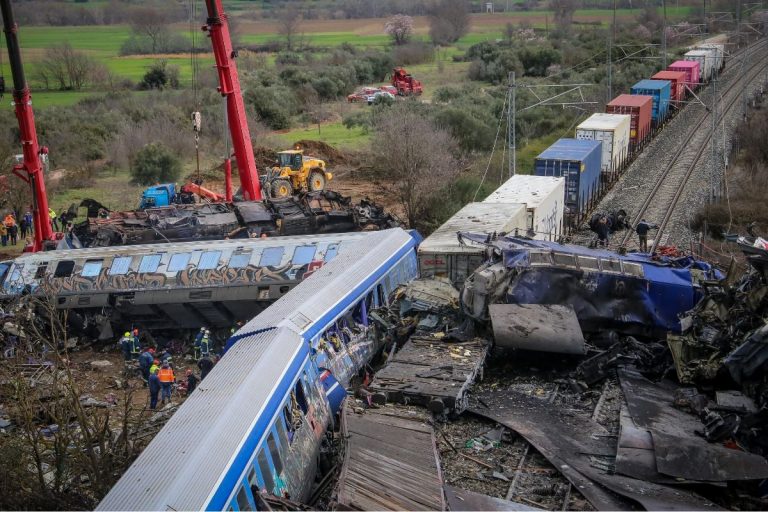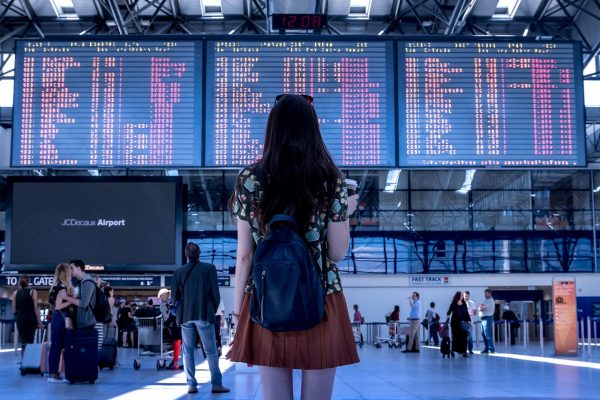
Citizens in every corner of the country are asking for “accountability for the crime in Tempi”, both with the repeated mass mobilizations culminating in the March 8 strike, and with their responses to the public opinion poll.
Characteristic of the specific poll by Marc, when asked what is the cause of the tragedy in Tempi, only 12.1% attribute it to human error or “bad timing”, although there was such a thing, as the stationmaster of Larissa has already acknowledged. However, an overwhelming percentage of 87% speak of other responsibilities that must be sought and attributed.
Mitsotakis: “We are all to blame” but “the tragedy happened with us at the helm of the country”
New criminal charges
At the same time, the Prosecutor’s Office brought three new additional criminal charges against persons who played a key role in the horrific accident.
In addition to the station master, the focus of authorities includes the OSE inspector, who put the 59-year-old on the specific night shift and went on sick leave 24 hours after the tragedy, but both station masters who seem to have been present until at 23:00 at night and left earlier, abandoning their post.
The fact that the station master is not the only one responsible for this tragedy is already recognized by the Court, as the new three persons are facing exactly the same charges as the 59-year-old, which means that they are recognized with the same share of responsibility.
The three involved are expected to be called to testify as defendants from tomorrow, Friday. But the process can be delayed as they can ask for a deadline. According to MEGA information, the inspector had already prepared for his apology as he had come to Athens after taking sick leave.
Penalties
Those accused of the Tempi tragedy face sentences ranging from 10 years to life in prison. Specifically, they are charged with the felony of disturbing the safety of transportation, as well as the misdemeanors of negligent homicide and negligent grievous bodily harm.
Also, according to information, other persons are expected to come under the microscope of the investigations, as if the safety systems such as the remote control and photo-signaling were working, then the horrible accident that cut the life of 57 people would have been avoided, so perhaps responsibilities will be sought there as well.
What does the inspector claim?
The head of the Third Inspection of the OSE, responsible for the shifts, seven days before he became accused for the train tragedy in Tempi, gave, testifying as a witness at the time, he admitted to the investigator that an inexperienced station master was assigned alone to the evening shift.
“Station master V.S. was certified competent by exams and from January 26, 2023 to January 31, 2023 he worked at night as an assistant at the Larissa station (apprenticeship alongside the station masters)… On February 28, 2023, V.S. had working hours from 22:00 to 07:00 and was the only station master on the evening shift. Between 22:00 and 23:00, there were and were serving at the same time three station masters, led by P. as the most senior in the service”, said the Larissa inspector in his testimony.
Responsibilities to the driver and the two station masters
The inspector in his first statement to the investigating officer blamed the tragedy on both the 59-year-old and the two station masters who were supposed to be at their post by 11 p.m.
However, as it turns out, for a longer period of time from 10 to 11 at night, the 59-year-old was left alone to manage the heavy traffic at the Larissa station. 13 routes in his shift and it is surprising that the 63-year-old inspector did not know about the early departure of the two afternoon station masters from their shift.
“Between 22:00 and 23:00, there were and were serving at the same time three station masters, led by P. as the most senior on duty. After the incident I was informed by the station master V. S. that since the start of his shift at 22:00 he was alone because neither P. nor X. were in the station master’s office. I also know that the central station master of Palaiofarsalon, Zindros Georgios, instructed the station master P. to stay until the smooth flow of traffic and to ensure the arrival of train 62 in Larissa, which was a few minutes late,” said the Larissa inspector in his testimony.
What the station master said about the departure time
In fact, the 59-year-old station master told him a different departure time for his colleagues than the one he told the police in his deposition. According to the statement of the remanded station master “around 10:10 p.m. to 10:15 p.m. H. P. left. Shortly after, around 22:20 to 22:25, K.P. also left.”
“When at 01:15 I met V.S. (the 59-year-old station master), I asked him why he was left alone, while there was a station master, he replied that P. (previous station master) handed over to him and left around 21:45 to 21:50. I asked P. again what time he left, and he replied that he departed normally without specifying an exact time. I think that if P. had simply secured train 2597, the accident might have been avoided…”, said the Larissa inspector.
The station master’s deposition
The 59-year-old station master who was the first to be singled out for responsibility and has already admitted his mistake is in custody.
The 59-year-old, during the seven and a half hours he was in front of the interrogator, answered the questions without apologizing and talked about everything. About his position at the stationmaster’s office, about how he became a stationmaster, being 59 years old, and of course what happened on the fateful night.
The arrested station master reported that when the accident happened, the Police called him to ask if there had been an accident. Right after he hung up, the Fire Department rang, informing him of the train collision. Immediately afterwards, he stated that he did not remember what happened.
He also stated: “I had seen on the board that when I turned the keys, after 2597 was entered, the lights were solid white. What I can guess is that the key engaged momentarily and then disengaged and I went back to the siding without the lights on the panel changing.’
On shifts
Asked about what time he came to work on February 28, the station master said: “My shift started at 10pm. Around 21:15 to 21:20 I received a phone call from my colleague G.T., who was working the night shift at Paleofarsalon station from 22:00 to 06:00. He was at Larissa station waiting for the train to to go to Paleofarsalo station and informed me that the afternoon stationmaster, Mr. P.K., would inform me about the execution of traffic, due to an incident at Paleofarsalo station.
P. informed me that in Paleofarsala, electric cables had fallen on train 56, which was running the Athens-Thessaloniki route, as a result of which the ascending line from Paleofarsala to Larissa was cut off.
For this reason, the traffic up to the Larissa station should be on a single line, specifically on the Paleofarsalon – Larissa descent line, with the result that this particular train will enter the Larissa station in reverse. If the train was arriving normally, it would have to move on the second line, which is an ascending line, but due to the above damage, in order to move from Paleofarsalo to Larissa, it would have to move on the first line, which is the descending line, and through a bypass in Larissa, to enter the ascending line.
This is how all trains from Paleofarsalo to Larissa should run until the damage is repaired. When I went to the station at 21:20 on the ascending line, train 56 was empty, that is, it was with a diesel engine and had received a new number 93506. This particular train left at 21:50 normally for Thessaloniki from the ascending line by order of the station master K. P. After some time around 22:10, train 63, heading from Thessaloniki to Athens, arrived normally on the descent line (1st line).
The absence of security systems is decisive
At the time when the criminal investigation of the case has started, both the experts and the railway workers, who in all the previous years sounded the safety nalarm, emphasize that if the safety systems had existed and were working, the accident would have avoided.
Prime Minister Kyriakos Mitsotakis admitted the same in yesterday’s cabinet meeting. The prime minister said, among other things, “I therefore take responsibility. And we cannot, we do not want to, we must not hide behind a series of human errors.
I will repeat what I have already written: if the remote control work had been completed this accident would have been practically impossible to have happened. And technology would have helped us to prevent the unthinkable: for several kilometers two trains moving on the same track on a collision course.”
Yesterday, in fact, there was a meeting between the Minister of State and Transport, Giorgos Gerapetritis, with the representatives of the Panhellenic Federation of Railways (POS) and other unions.
In his statements after the meeting, the president of POS, Yiannis Ditsas, said that “proposals were submitted by POS that are timeless, but today relevant, for an open, safe and quality railway”.
“The ministry’s commitment,” he said, “is that in order for the railway to restart, all guarantees must be in place from the
on behalf of the state and on the part of the workers for the safe operation of the railway. We will meet again next week to see how the process will proceed.”
What railway workers want
According to railway sources, among the Unions’ proposals, which will be concretized and integrated into a single text, the adoption of measures is included, such as:
- Psychological support for Traction and Train Traffic workers.
- Gradual reopening of arterial trains and their staffing by the Train Traffic and Control Staff with three employees.
- Immediate re-operation of commercial trains in Northern Greece and, following the rehabilitation of the railway infrastructure, gradual rerouting of all commercial trains.
- Reduction of speed limits on non-remote network segments.
- Update of the General Traffic Regulation and its faithful application.
- Clear definition of the duties of the train conductor.
- Proper flow of parts to increase and reliability of rolling stock.
- Training of Traction and Traffic personnel on all rolling stock.
- Direct coverage of the needs of the Traffic Network Directorates.
- Reduction of passenger routes by approximately 50% (arterial trains).
- Gradual increase of all suburban train routes.
- Restart GSMR.
- Immediate tenure of colleagues with rated service delivery.
- New announcement for positions related to the organizational chart within three months.
Latest News

WTTC: Travel & Tourism to Create 4.5M New Jobs in EU by 2035
This year, international visitor spending is set to reach 573 billion euros, up by more than 11% year-on-year

IMF: US Tariffs Shake Global Economy, Outlook Downbeat
IMF slashes global growth forecast to 2.8% as U.S. tariffs create uncertainty and ‘negative supply shock

First Step Towards New Audiovisual Industry Hub in Drama
The project is set to contribute to the further development of Greece’s film industry and establish Drama as an audiovisual hub in the region

Airbnb Greece – Initial CoS Ruling Deems Tax Circular Unlawful
The case reached the Council of State following annulment applications filed by the Panhellenic Federation of Property Owners (POMIDA)

Mitsotakis Unveils €1 Billion Plan for Housing, Pensioners, Public investments
Greek Prime Minister Kyriakos Mitsotakis has announced a new set of economic support measures, worth 1 billion euros, aiming to provide financial relief to citizens.

Alter Ego Ventures Invests in Pioneering Gaming Company ‘Couch Heroes’
Alter Ego Ventures' participation in the share capital of Couch Heroes marks yet another investment by the Alter Ego Media Group in innovative companies with a focus on technology.

Corruption Still Plagues Greece’s Driving Tests
While traffic accidents continue to claim lives on Greek roads daily, irregularities and under-the-table dealings in the training and testing of new drivers remain disturbingly widespread

Pope Francis Died of Stroke and Heart Failure Vatican Confirms
As news of the official cause of death spread, tributes poured in from across the globe. The 1.4 billion-member Catholic Church is united in grief, remembering a pope who championed inclusion, justice, and compassion

Increase in Both Museum Visits, Revenues for 2024
As expected, the Acropolis was the top archeological site in the country, followed by Sounion, Mycenae, the ancient theater of Epidaurus, and Vergina in northern Greece

Where Greece’s Tourists Come From: A Look at 2025’s Top Visitor Markets
The United Kingdom continues to hold the top spot as the largest source of incoming tourism, with 5.6 million seats booked for Greece this summer — up 2.2% from last year. This accounts for 20% of all international air traffic to Greece
















![Ξενοδοχεία: Μεγάλο το ενδιαφέρον για επενδύσεις στην Ελλάδα – Η θέση της Αθήνας [γραφήματα]](https://www.ot.gr/wp-content/uploads/2025/03/Athens-hotels-90x90.jpg)
























 Αριθμός Πιστοποίησης
Αριθμός Πιστοποίησης